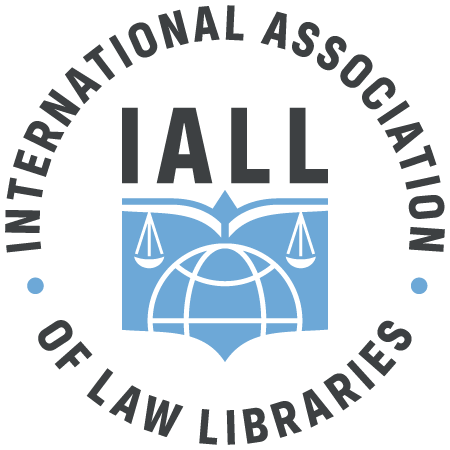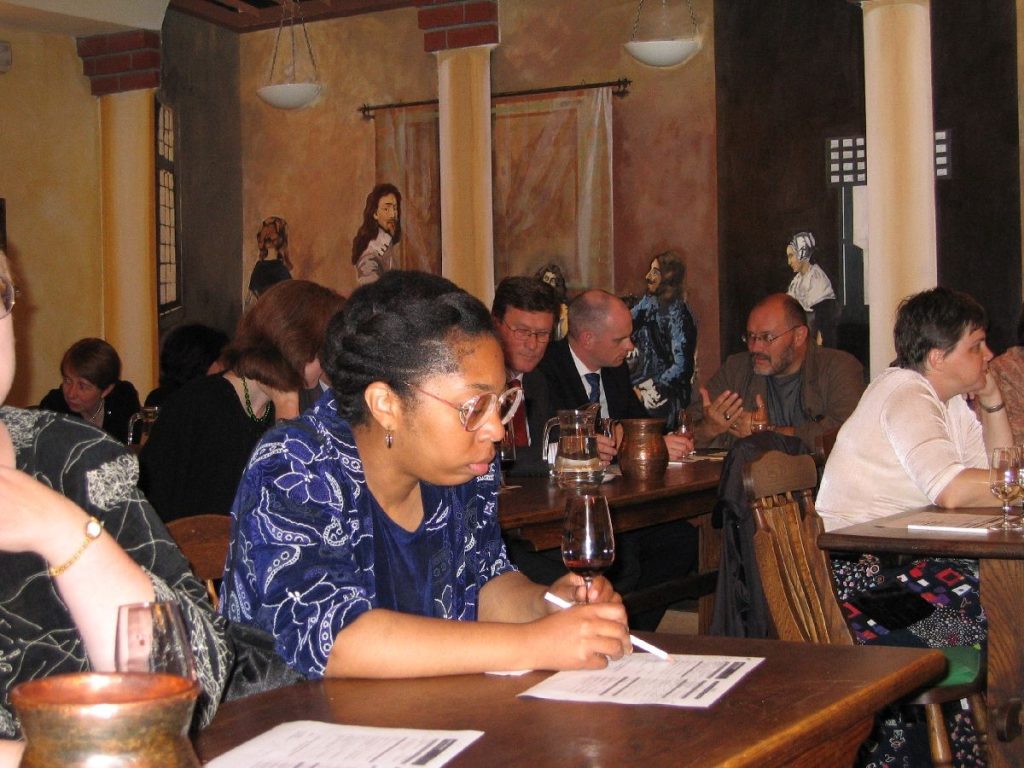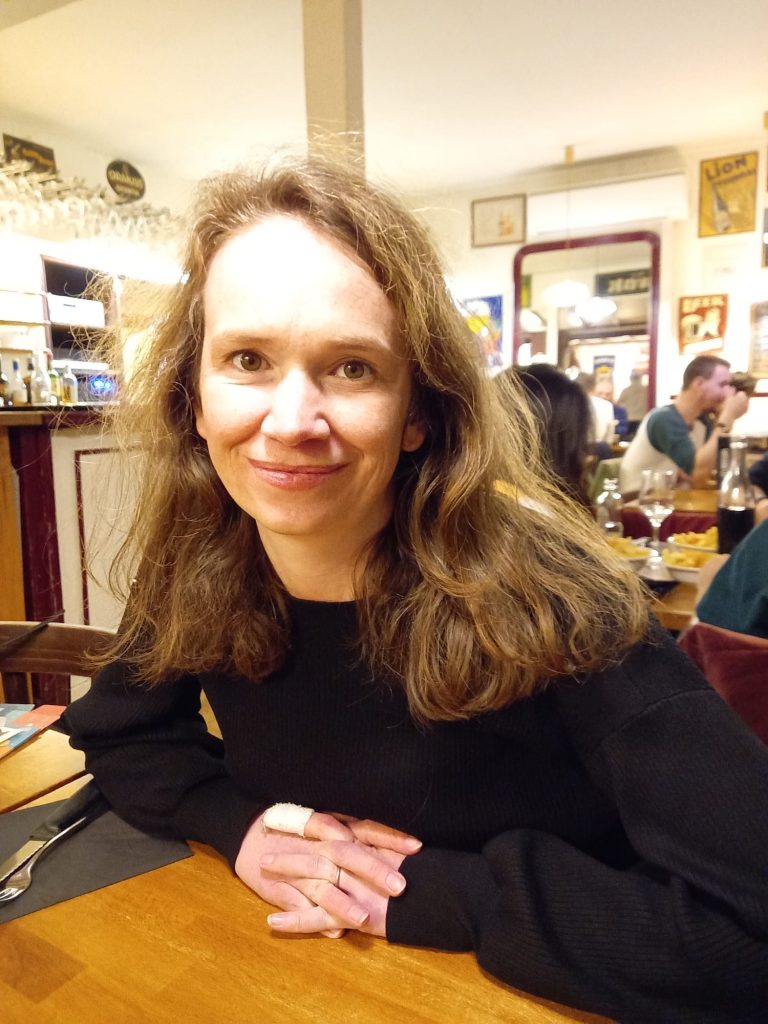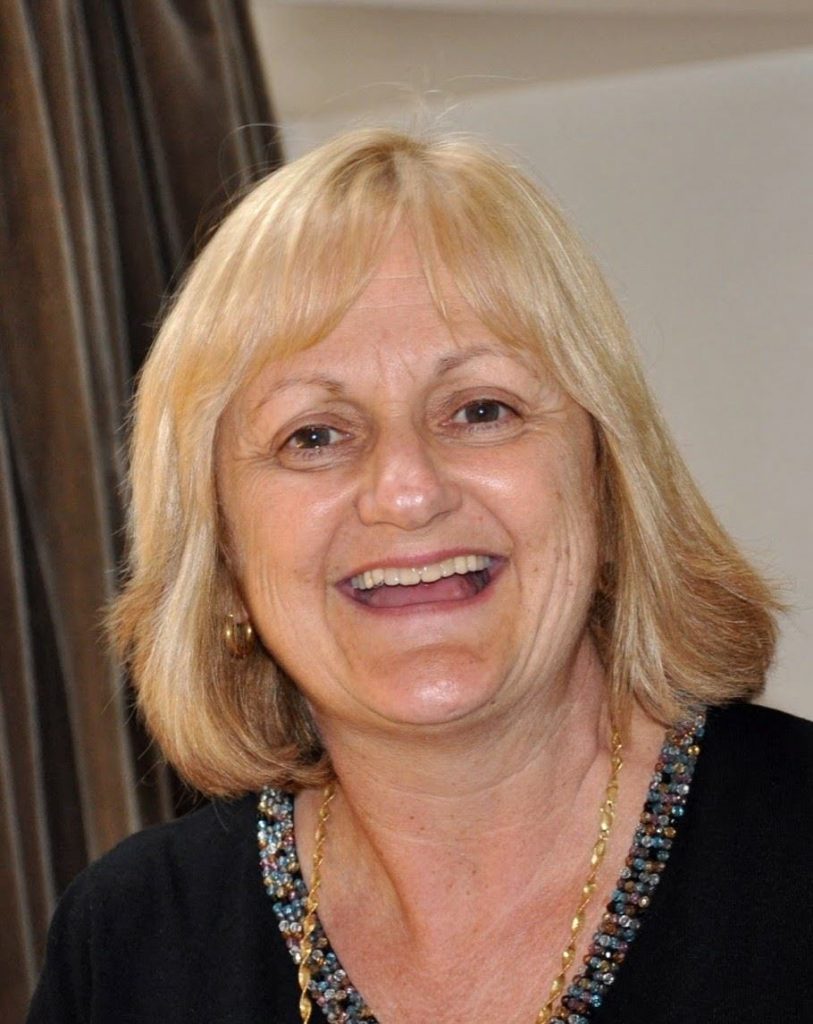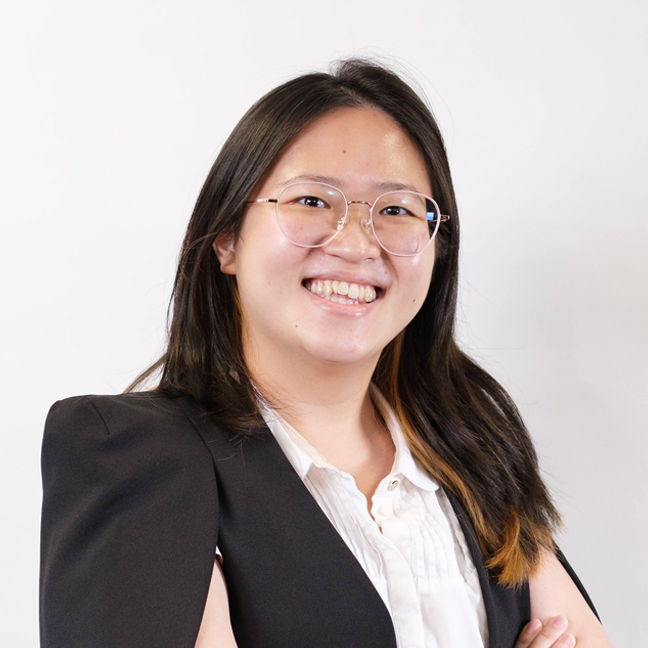
Have you ever wondered who the people are behind the names of IALL Board members? To find out and introduce ourselves to you, we asked board members a serious series of questions about ourselves.
By: Vanessa Blackmore,
Manager, Law Courts Library, Sydney, Australia
Member of the IALL Board of Directors
Claudia Holland, Max Planck Institute for Comparative and International Private Law, Hamburg, Germany
Why did you become a librarian?
When I started my first law exam, the waiting time for a trainee lawyer place, which you need to prepare for the second state exam (=Referendariat), was quite long – sometimes over a year. Since I wanted to get ahead faster and I had already worked in the library as a student, the decision to become a librarian was quite consistent to me. The work was varied, interesting and I enjoyed it a lot.
What was your first job in a library?
I worked in the circulation desk and wrote reminders for overdue books that had been borrowed. On Saturdays and in the evening I supervised in the central reading room.
What attracted to you to law libraries?
When I decided to pursue a career as a librarian instead of the traditional legal career, it was crucial for me that as a subject librarian I also had to deal with law in terms of content.
What is your academic/professional history?
I studied German and French law at the universities of Göttingen and Saarbrücken. After the first state examination in law, I subsequently passed the assessor’s examination in librarianship.
My professional career took me from the University of Freiburg (Faculty of Law) to Leipzig (University Library) to the Federal Constitutional Court and back to Leipzig. Since 2016, I have been library director at the Max Planck Institute for Comparative and International Private Law – a position that is very fulfilling and brings me together with many international academics and colleagues.
What do you like most about IALL?
I got to know the work of the IALL mainly through the Annual Conferences. I really appreciate the international exchange with colleagues and suppliers. Each time, I learn something new about a national legal system and also come to know how others deal and solve with the same problems we do in our library. Every time I come home with new suggestions and solutions.
What are you looking forward to most about your role on the IALL Board?
Unfortunately, I was not able to be at Stanford and talk to the other board members in person. As a newcomer, I still have to find my place and my role. However, having been active in national library associations for over twenty years, I am sure I will be able to learn the ropes quickly.
What’s something most of your colleagues do not know about you?
In 1991, shortly after German reunification, I was responsible for setting up a new law library in Dresden – as part of the university library. At the beginning there was no regular budget, only donations. So I travelled with two caretakers and some students in a truck to collect books from other libraries that were no longer needed there. It was a very exciting time.
David Wills, Squire Law Librarian, Squire Law Library, University of Cambridge, UK
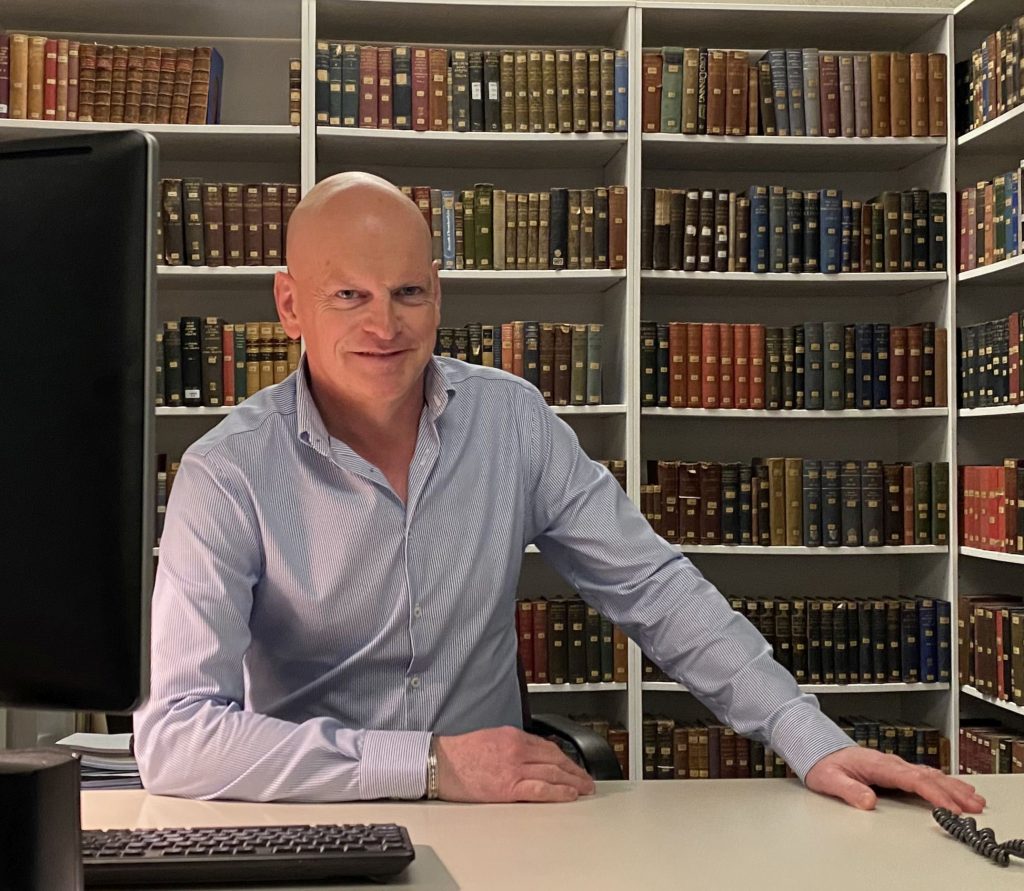
Why did you become a librarian?
In some ways, I became a librarian by accident. In the late 1980s I was interested in the work of both libraries and museums and was considering which career to pursue out of those two options. Virtually on the toss of a coin I decided that libraries were the direction for me and, at the time, I felt that academic librarianship would be an interest option. However, at that stage, I hadn’t considered the possibility of a career in ‘law libraries’.
What was your first job in a library?
Having left library school, I was fortunate to take up an appointment in the UK’s civil service working for the Home Office Library and Information Service (between 1990 and 1993). This introduced me to government, parliamentary and legal material and over the course of three years I worked as a cataloguer and then as an Information and Readers Services Assistant Librarian.
What attracted to you to law libraries?
My work at the Home Office meant that I gained a useful introduction to UK legal sources; working with legislation and case law interested me. Using online resources like Lexis, and the early versions of Justis (on CD-Rom!), was also an exciting prospect. When a position as Assistant Library Officer (Deputy Librarian) at the Squire Law Library, at the University of Cambridge, was advertised in 1993 I felt that it was a natural career progression for me given my experience at the Home Office. I was particularly drawn to the academic study and research of law
What is your academic/professional history?
I read Ancient History and Classical Archaeology at the University of Sheffield for my undergraduate degree. The classical world is a subject that I still feel passionate about, and that period of history still resonates today. After that, my professional career took me into retail management for three years, then, once qualified as a librarian, the Civil Service (as mentioned previously), and then into academic law libraries (in 1993) where, in 1996, I became the Squire Law Librarian. Overall, I am now in my 30th year at the Squire! Alongside my work at the Squire, I have undertaken a number of senior management roles in the wider University Library environment at Cambridge. Also, since 1998 I’ve been an active member of the British and Irish Association of Law Librarians (BIALL), was President of the Association in 2010/2011 and was awarded Life Membership in Between 2011 and 2022 I was the editor-in-chief of the journal Legal Information Management published by Cambridge University Press. Among a number of external roles, I am a member of the Advisory Council for the Institute of Advanced Legal Studies (IALS), University of London. I held a Visiting Fellowship in Law Librarianship at IALS in 1997-1998 and I am a Fellow of the Society for Advanced Legal Studies. I was elected to the Board of Directors of the International Association of Law Libraries (IALL) for the period 2022 2025. In the past, I have attended several of IALL’s Annual Courses.
What do you like most about IALL?
IALL brings together law librarians from across the world who represent a range of different legal environments, such as academic law libraries and court library services. The opportunity to share information and experiences, to network with others in the profession and to learn from colleagues – these are some of the things that I appreciate most about IALL. Having a global community of legal information professionals is a great comfort when assisting academic colleagues with all manner of enquiries relating to legal jurisdictions from all over the world.
What are you looking forward to most about your role on the IALL Board?
To network with others and to meet and to communicate with colleagues globally who are working in the law library/legal information profession. I feel privileged to be a Board member and hope to be able to contribute to the work of the Association in various ways. I’ll be chairing IALL’s Education Committee and hosting the IALL Board’s Strategy Meeting in March.
What’s something most of your colleagues do not know about you?
I’m not good at questions like this!!! One answer could be: Though I am not related in any way, my family had a connection to the explorer Ernest Shackleton!
Jean M. Wenger, J.D., M.L.I.S., Director of the Law Library/Senior Lecturer, Chicago-Kent College of Law, USA
Why did you become a librarian?
After my first year of law school, I was looking for a summer law job. A lawyer I knew mentioned the Cook County Law Library, a public law library in the main courthouse in Chicago, hired summer clerks. I interviewed and got a job at the reference desk. I was hooked at the end of my first week. The work was fascinating and very satisfying. I worked with and learned from incredibly talented and fun librarians.
What was your first job in a library?
After I graduated from law school, I was offered a full-time job as a Reference Librarian at the Cook County Law Library. Most research was conducted in books then, as legal databases were best described as nascent. Back then, we daily assisted hundreds of attorneys with questions on every conceivable area of law. What a fantastic learning environment!
What attracted you to law libraries?
I developed lasting professional relationships with my colleagues at my law library and within the local and national (and now international) communities. I was attracted to the law as a discipline, the chance to work in a public services environment, and the opportunities to teach and satisfy my natural curiosity to discover information. I also viewed librarianship as a field with endless possibilities. My motto: When I stop having fun, I’ll do something else!
What is your academic/professional history?
I have a Bachelor of Arts (B.A.) with a major in public administration and a minor in Economics from St. Mary’s University of Minnesota. I have a Juris Doctor (J.D.) from the University of Illinois and a Masters in Library and Information Science (M.L.I.S.) from Dominican University. I maintain my Illinois law license and am active in the Illinois State Bar Association.
What do you like most about IALL?
I enjoy meeting colleagues from other countries, learning about similar challenges and opportunities, and sharing ways we engage with our institutions and stakeholders. The IALL Annual Course is one of the best educational events, and I look forward to it every year.
What are you looking forward to most about your role on the IALL Board?
IALL members are dedicated and engaged, and I’ve learned so much. The chance to give back, to meet and work with IALL members, and to promote sharing knowledge and resources across borders is what I look forward to as the IALL treasurer.
What’s something most of your colleagues do not know about you?
I like drawing and painting but need to carve out more time to pick up the brush and pencil. I love traveling and hiking, and I’m a bit of a history buff.
Lyonette Louis-Jacques, Foreign and International Law Librarian & Lecturer in Law, The University of Chicago Law School D’Angelo Law Library, Chicago, USA
Why did you become a librarian?
I became a librarian because it was the first job people suggested I could do since “I liked to read a lot”. I have been working in libraries since my early teens. From working in different positions in different types of libraries (public, academic, law) before I became a professional librarian, I knew I could do the job.
What was your first job in a library?
I started working as a page shelving young adult fiction and romance books in our local public library. That’s when I developed a love for the authors usually published in large print – Barbara Cartland, Elizabeth Cadell, Mary Stewart, Victoria Holt – and the romance genre generally. Georgette Heyer’s Regency romances remain my favorite books.
What attracted to you to law libraries?
When I was in college and after I graduated, and while in law school, I worked at the law library circulation desk and in cataloging, so I had experience with law libraries. But, what made me decide to pursue a career in law librarianship was interacting with the law students. While at the circulation desk, they would ask me basic legal reference questions that I couldn’t answer. Because I wanted to help them, I asked law library director at the time what I can do. He gave me a copy of Legal Research in a Nutshell, and the rest is history. I decided that I wanted to become a legal reference librarian in an academic law library so that I can continue to help students do their research. It is a very satisfying feeling to help them be successful.
What is your academic/professional history?
I’m a graduate of the College of the University of Chicago (A.B. 1979) and the Law School (J.D. ’86). I got my library science degree from the University of Michigan (A.M.L.S. 1983). My first job out of law school was Foreign and International Legal Reference Librarian at the University of Minnesota Law Library (1986-1992) and my second and current job is Foreign and International Law Librarian at the D’Angelo Law Library, University of Chicago Law School (1992-date). Besides IALL, I’ve held leadership positions in the American Association of Law Libraries (AALL) including chair of the Foreign, Comparative, and International Law (FCIL) and Computing Services (CS) special interest sections, and service on the AALL Executive Board (2005-2008), and actively participate in and am member of other law and library associations. I am co-founder, with Mila Rush, of the INT-LAW (International Law Librarians) email list.
What do you like most about IALL?
It hard to say what I like the most about IALL, so I’ll mention a few. I get to travel to different countries. I get to meet law librarians and legal information professionals who are knowledgeable, friendly, and have good senses of humor. I get to hear languages other than English. And I like the substantive law content of the IALL course sessions and the long breaks to chat, drink, snack, relax. And I like the memories (the wine tasting at IALL 2003 in Cape Town, South Africa!).
What are you looking forward to most about your role on the IALL Board?
As a member of the IALL Board, I’m looking forward to contributing in any way I can to help grow the membership and participation in IALL of law librarians and legal information professionals from all parts of the world.
What’s something most of your colleagues do not know about you?
Since I started doing this during the pandemic, I’m fairly sure only people on Twitter know, but I’ve become addicted to TV dramas! I’ve been enjoying binge-watching Korean, Chinese, Japanese, Thai, Filipino, Vietnamese, and Turkish romances on my laptop, and I’m getting pretty good at saying “I love you” and “I’m sorry” in Korean…
Mark Engsberg, Hugh F. MacMillan Law Library, Emory University School of Law, Atlanta, Georgia, USA
Why did you become a librarian?
I was finishing my PhD in English Literature and knew I didn’t want to return to law practice and the academic jobs for newly minted English professors were very few. Law Librarianship was a natural fit with my academic and professional background. The University of Illinois, where I was enrolled in the graduate college studying English, also happened to have a first-rate library program. It just made sense.
What was your first job in a library?
I was a graduate assistant at the law library at University of Illinois at Urbana-Champaign. The law library was greatly understaffed at the time and so my fellow grad assistants and I were pretty much the “reference staff” for the library. While this was not a professional job per se, the nature of the work was essentially that of a fully credentialed reference librarian. My first professional job in a library was as a reference librarian at Yale Law Library in New Haven, Connecticut.
What attracted to you to law libraries?
It was a natural fit with my previous law degree and practice, and librarianship valued my other academic credentials as well. When I attended my first AALL meeting, and then later my first IALL meeting, I knew I had “found my people.” I’ve never looked back.
What is your academic/professional history?
BA in English and Political Science – Drury University, Springfield, Missouri (1984) JD from Willamette University College of Law – Salem, Oregon (1987) US Army Judge Advocate General’s Corps – Legal Assistance and Administrative Law Attorney, Baumholder, FRG (1988-1991) MA in English, University of Illinois at Urbana-Champaign (1994) PhD in English Literature, University of Illinois at Urbana-Champaign (1999) MS in Library and Information Science, University of Illinois at Urbana-Champaign (2000) Reference Librarian, Yale Law Library, New Haven, Connecticut (2000-2001) Foreign and International Law Librarian, Yale Law Library, New Haven, Connecticut (2001-2006) Head of Reference, Yale Law Library, New Haven, Connecticut (2006-2008) Director of Library Services and Professor of Practice, Emory University School of Law, (2008-Present)
What do you like most about IALL?
The small, intimate nature of the organization and its conferences. One can really get to know the membership and develop lasting professional and personal relationships. Also, the work of IALL is important and makes a positive difference in the world.
What are you looking forward to most about your role on the IALL Board?
Working with new board members and helping the leadership team continue all the best aspects of the IALL while also moving the association into its next phase. It’s an exciting time for the IALL!
What’s something most of your colleagues do not know about you?
One summer while I was in college, I lived with my older sister in Kansas City, Missouri and performed odd jobs at a large funeral home. Such was my summer job that year. I learned a great deal about life, death, the funeral “industry,” and the forms and processes of grieving during that summer when I was only 19.
Rebecca J. Five Bergstrøm, University of Oslo, Law Library, Oslo, Norway
Why did you become a librarian?
Becoming a librarian sort of just happened. I had just finished my five years master’s degree in law. Randi the former director of the law Library tipped me off that a temporary position was available. I applied, got the job. I found the work so interesting and diverse, and I had such lovely colleagues that I applied for a permanent job, and the rest is history.
What was your first job in a library?
My first job was as a student in the Law library. The job was mainly being part of the team manning the counter. And I also had some extra work in the summers working with the collections in storage and in the main Library.
What attracted to you to law libraries?
I can’t put my finger on what exactly attracted me to law libraries. However, I can say that the law Library lets me combine the best of two worlds, Law and Technology. I find it really gratifying to both support the researchers and teach students in information literacy and help them find the legal sources they need. I also find it really interesting to dig into the legal implications of copyright and data privacy regarding data management and open science. And also, other legal issues that turn up on a day-to-day basis in a Academic Library.
What is your academic/professional history?
As one who was above average interested in natural sciences, I started studying to be a graduate engineer in Trondheim at NTNU. I realised after a couple of years that that wasn’t my cup of tea and entered a five-year master’s programme in Law at the University of Oslo. I couldn’t completely let the natural science go, so I took a course in programming in addition to Law. I worked as previous mentioned, in the Law Library during the latter part of my degree. I started working at the Law Library in Oslo in 2009 and permanent from 2010. I became head of the Public and international law library, a small branch of the Law library, in 2016. The law libraries branches were merged in December 2019. I am now library contact for both Norwegian Centre for Human Rights and Department of Public and International Law in addition to being the main subject specialist and leader of our work on collections and research support at the Law Library, among other things.
What do you like most about IALL?
The people, and the possibilities to get academic input on different legal topics.
What are you looking forward to most about your role on the IALL Board?
Working with all the great people on the board. Improving our visual profile and content online so it can be even more interesting for our members, potential new members, and others.
What’s something most of your colleagues do not know about you?
I love dogs and horses, but I’m a bit scared of cats.
Sonia Crenn, ICRC Library. International Committee of the Red Cross, Geneva, Switzerland
Why did you become a librarian?
I like to think it was part chance – I didn’t study library science – and part destiny! I used to always overdo the research part of assignments in university. Overall I really enjoy helping people find the information they need.
What was your first job in a library?
I was an intern at the International Committee of the Red Cross library (where I currently work).
What attracted you to law libraries?
The ICRC library specializes in international humanitarian law. From the beginning I liked the idea of a collection covering every possible aspect of this very specific field of law over 150 years (and counting). I love to see the new angles and questions that scholars come up with, sometimes even on topics that have been written extensively about (I’m looking at you cyber warfare!) I also love research questions where I get to dive into history, either looking at the development of the law or past state practice.
What is your academic/professional history?
I studied law at the university Paris Nanterre and then joined a multidisciplinary international relations program at Pantheon-Sorbonne university. I worked for a couple of years on international cooperation in higher education before moving to Geneva and eventually starting to work at the ICRC library.
What do you like most about IALL?
Taking part in the annual course. I love the friendly atmosphere and learning about other fields of law from great speakers.
What are you looking forward to most about your role on the IALL Board?
I am looking forward to thinking collectively about making IALL even greater 🙂
What’s something most of your colleagues do not know about you?
My first summer job with an official paycheck was working in a lab at a university where I was in charge of feeding the rats! The expression in French to refer to people who spend a lot of time in libraries is rat de bibliothèque (library rat), so maybe there’s a connection there?
Vanessa Blackmore, Manager, Law Courts Library, Sydney, Australia
Why did you become a librarian?
After finishing a Bachelor of Arts degree, I realised I did not want to go on to complete a Graduate Diploma in Education, as I did not want to be a teacher. I asked one of the university librarians how she qualified and found out that my own university offered a Graduate Diploma in Librarianship. I applied for the course and decided to become a librarian. I was keen to work at the State Library of New South Wales, a grand library I frequented during my undergraduate years.
What was your first job in a library?
I was fortunate enough to be hired by the State Library of New South Wales as one of sixteen new graduates of the University of New South Wales Graduate Diploma in Librarianship. I worked in the general reference library and worked shift work, including Saturdays and Sundays, to earn extra money to travel overseas.
What attracted to you to law libraries?
I worked in London at the Australian High Commission Library which had collections of Australian legislation, law reports and other legal texts. The High Commission was very near the Royal Courts of Justice and Inns of Court, and we were often asked for Australian legal publications. I had to learn about legal materials very quickly, and the law piqued my interest! On my return home to Sydney, I got a job at the library of the NSW Parliament, where I frequently used my new knowledge of legal publications assisting members of parliament. After another stint working in Kuwait, I returned to Australia and was fortunate enough to gain a position at the Law Courts Library in Sydney, one of the largest law libraries in Australia. I love the variety of work involved in providing legal information to all courts and tribunals in NSW, which reflects the diversity of cases that come before the courts. One of the great joys of working here is you never know what matters will come before the courts. Our work ranges from locating centuries old English statutes or cases, to providing training and assistance to judicial officers in accessing legal publications on their iPads and supporting the publication of decisions on Caselaw NSW.
What is your academic/professional history?
I started work at the State Library of NSW for three years, then went to London and worked at the Australian High Commission Library. On return, I worked at a local technical college library and for multi-national company Unilever in their corporate library. My experience in London helped me get a position at the NSW Parliamentary Library, researching a varied range of topics for members of parliament. I gained an understanding of the parliamentary process and developed a keen interest in how government worked. After completing a Masters in Public Sector Management at the University of Technology, Sydney, I had subsequent roles as private secretary to a government minister, and in policy research in the NSW Department for Women, which furthered my understanding of executive government. I moved to Kuwait for a while and worked in an American high school. When a position came up at the Law Courts Library on my return to Sydney, I was able to complete my experience of the separation of powers between parliament, executive and judiciary. A Graduate Diploma in Criminology from the University of Sydney and Master of Legal Studies from the University of New South Wales increased my subject knowledge.
In 1999 I spent a very enjoyable 5 months in London again, this time as visiting fellow in law librarianship at the Institute of Advance Legal Studies, University of London.
I have held several roles at the Law Courts Library, including as systems librarian and leading the reference and research team. I am privileged to lead a team of talented and dedicated staff who provide access to comprehensive, accurate and comparative legal information and research services to judicial officers and decision makers across NSW. A large print collection of over 400,000 volumes is located in the Law Courts Building, which also houses the Supreme Court. An extensive range of digital legal publications are available to support decision makers wherever they are.
I have also been an active member of the Australian Law Librarians Association, and as a former president, was privileged to attend a AALL conference in Boston, and several BIALL conferences in the UK. I also began to attend IALL meetings, representing our local association.
What do you like most about IALL?
IALL provides opportunities for librarians to connect with others around the world., fostering networking and mentoring. No one library can hold a copy of every legal publication from every worldwide jurisdiction. Relationships built when attending IALL meetings can prove invaluable for comparative legal research. IALL provides opportunities to learn about the law of other jurisdictions and build lifelong collaboration.
What are you looking forward to most about your role on the IALL Board?
I am particularly interested in the board mission to support and further education and professional development for legal information professionals across the world. IALL is a special organization that uniquely bridges borders and culture. I’m concerned about free access to primary and secondary legal information globally.
What’s something most of your colleagues do not know about you?
I was born in England and moved to Australia with my family when I was 17. I consider myself to be a fortunate citizen and passport holder of both countries!
Yee Xin Chai, Senior Librarian, C J Koh Law Library, National University of Singapore
Why did you become a librarian?
Halfway through my law degree, I realised I did not want to be a legal practitioner and started looking at alternate career paths. I started talking to law librarians across London from both the academic sector and private sector and found that there were aspects of librarianship that I could see myself being interested in. These conversations set me on the path to an information science masters which subsequently led me to libraries.
What was your first job in a library?
My first job was at a high school library in Malaysia; however, I had only been in that role for a few months before I was invited by Singapore Management University to apply for their law librarian position. Working with SMU Libraries really cemented my passion for the role!
What attracted to you to law libraries?
What attracted me to law libraries was the ability to work with users and teach them legal research, which I find a very interesting topic. I enjoy working with students especially and want to find ways to make research more enjoyable and less daunting to people. I also think accessibility to information is incredibly important, especially as we see increased barriers to information as of late – it is in this that I think librarians have an important role to play.
What is your academic/professional history?
I’ve worked as a librarian for Singapore Management University for five years before moving on to the National University of Singapore in 2022 to work as a Senior Librarian for the C J Koh Law Library.
What do you like most about IALL?
Without a doubt the community, I really appreciate how willing everyone has been to help each other and share their knowledge. There is such a genuine love and interest for learning that I find truly inspiring.
What are you looking forward to most about your role on the IALL Board?
Being able to collaborate with librarians from around the world! I would like this to be an opportunity for law librarians from Singapore to be able to connect and learn from the global community as well.
What’s something most of your colleagues do not know about you?
I’m a queer librarian and other than law I have an interest in invertebrate zoology!
This Blog contains entries by members of the International Association of Law Libraries on issues germane to the Association’s areas of focus. Views expressed in an individual entry only represent the views of the author.
